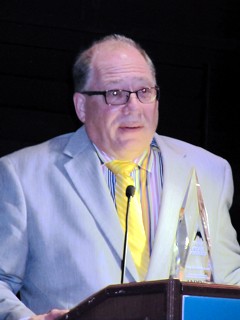Reg Cunningham
2014 PEAK Award Recipient

He's Your Man
Reg Cunningham Receives IADD 2014 PEAK Award
When you need someone with the expertise and creativity to help you solve a complex diecutting problem, just ask Reg - he’s your man.
Looking for a source of information on safety issues, manufacturing processes, green environment, lean manufacturing, etc? Just ask Reg - he’s your man.
Whether you’re trying to attract new IADD members, to increase the number of Odyssey exhibitors and attendees or looking for a hot topic and knowledgeable speaker to bring value to a local chapter meeting, just ask Reg - he’s your man.
For these reasons—and many, many more—Reg Cunningham of St. Michael, MN, USA was presented with the 2014 PEAK Award at the recent IADD Annual Meeting. PEAK stands for Passion, Excellence, Achievement and Knowledge, qualities for which Reg is no stranger.
Cunningham has served or is currently serving as a Chapter Chair, Board member, Vice President of Chapters and member of the Safety, Membership, Program and other committees and task forces. Eager to share information, he is ready and willing to take on any task you set before him, allowing him to make such a positive impact in so many areas of the IADD and industry. He brings a level of enthusiasm, excellence and energy to all that he undertakes.
IADD President Darrel Griffin explains, “Reg sees the big picture and all of the components that make it work. He’s always learning and sharing; educating himself and as many folks that he can along the way. When you ask Reg to help, he will do it.”
Cunningham’s start in the industry began when he was asked by a friend’s mother, “What are you going to do for a career?” When he replied that he wasn’t sure, she told him the packaging company she was working for was looking for young people with “get up and go.” He was interviewed and hired.
He started at Howell Packaging (later called Dover Packaging) in an entry-level position on the floor pushing paper waste up into a baler system. From there he ran an air hammer stripping gun. At the same time, he went to college for business. He then moved in to the diecutting department to train as a diecutter/pre-makeready person. The company was growing and adding new equipment—and Reg wanted to learn everything. His thoughts were, “The more I know, the more I’m worth to this company and to every other folding carton company out there.” So he spent time running a sheeter, on the back of a printing press, aerator, etc.
Cunningham made sure he was made part of every new team the company started—the safety team, waste team, cost saving team, new equipment team. At this point in his career, he was sent to join the management team. He was given responsibility for the diecutting shop and what existed of a diemaking shop. By this time he had taken college courses at George Brown and Sheridan College on executive management. He was also getting involved with the finishing department. When the plant manager left, it created an opening; Reg was asked to take over the whole plant.
By this time the company had more than doubled in size. They opened up a second plant and took on lean manufacturing with the help of Price Waterhouse, a big undertaking which never stopped. Reg was key in making sure the company got everyone who worked there involved.
The second plant was opened with all new people and it was a lot of work keeping the same quality and service their customers were used to.
In 2005, the business was sold. Cunningham took time looking for where to go next. As he says, “I got a call from a company in the USA. We met, spoke, had a vision, and I was hired. This was a perfect fit for both parties. I moved to the US and started where I had left off. I spent time training, changing and getting people adapted to doing things differently. The company spent a lot of time and money on people and equipment. We were growing so fast that a second plant was needed to keep up with production. This gave us the ability to respond to customer concerns about having only one plant and to increase productivity. We had a lot of customers for whom we were handling 100% of their business. The second plant satisfied their needs. There are now two plants and they are doing very well.”
With all his experience, Cunningham has faced many challenges in the industry. He feels the largest is the lack of training. “This is an industry that has no school to send people to learn so that when they join your company they are ready to go. Companies can spend millions of dollars on equipment and have no one trained to operate it properly or to its fullest capacity. The other big challenge companies face is they operate in survival mode. When you operate in this mode ,you are taking work just to keep the lights on. This hurts the industry as a whole because it is forces margins lower. When you are unable to re-invest in your plant you will become obsolete.”
His advice to those considering entering the industry is to “learn as much as you can about everything in the company. If you get an opportunity to get more training, some companies will pay for it if it relates to the business. Join different associations if your company will let you join. Networking with people in the industry is huge. Think of yourself as your own corporation—the more you know, the more you’re worth to your company and every other company out there.”
Cunningham believes the future is bright and that the biggest challenge for companies in our industry is the need to reinvest in new technologies. He feels that constantly updating and making processes more efficient with the use of the latest technology is key to moving forward. “So is investing money into the most important resource in your business—the employees,” he explains. “It sometimes does not cost that much. Keeping quality employees on board is the key to a successful plant.”
As for his involvement in the IADD, Cunningham states, “I did it because I know it was the right thing do. There is a wealth of knowledge out there in this industry, and now you can get it all online thanks to the IADD. The more people you know and resources you have, the better you and your company will be. It also allows me to network with people in every aspect of the industry around the world. It is great to have so many people working together to make this industry the very best it can be. It allows me to stay ahead of the technology curve which is crucial.”
In just the past two years, Cunningham has been a positive influence in at least nine areas of the IADD: safety, membership, chapters, Annual Meeting, Board, technical, Odyssey, The Cutting Edge magazine and as a speaker. When asked how he finds the energy for all of this and what he’s learned from it, he replies, “For those people who know me, this has never been a job for me, it has been a passion. It’s about giving back, learning and helping someone along the way. If I can say something or do something that is beneficial to a member and will help them do things more efficiently or prevent them from making a mistake—that is why I enjoy the IADD.
Cunningham credits his best friend and wife Diane for keeping him in line. They have five children; two live in Canada and three live in the US. They also have six grandchildren. Reg admits that he doesn’t have a lot of time for hobbies, though he does enjoy a round of golf every now and then. He’s also, in his words, “a big sports nut—hockey, baseball and football, college or professional—bring it on!”
When asked what legacy he’d like to be remembered for, Cunningham says, “To any company I worked for, that I gave it my all. To people along the way, hopefully that I made a difference. I know some learned and some didn’t. I do know I have made a lot of friends along my journey.”
“This association and the people I work with in it mean a lot to me. I will do what it takes to make it better.”

